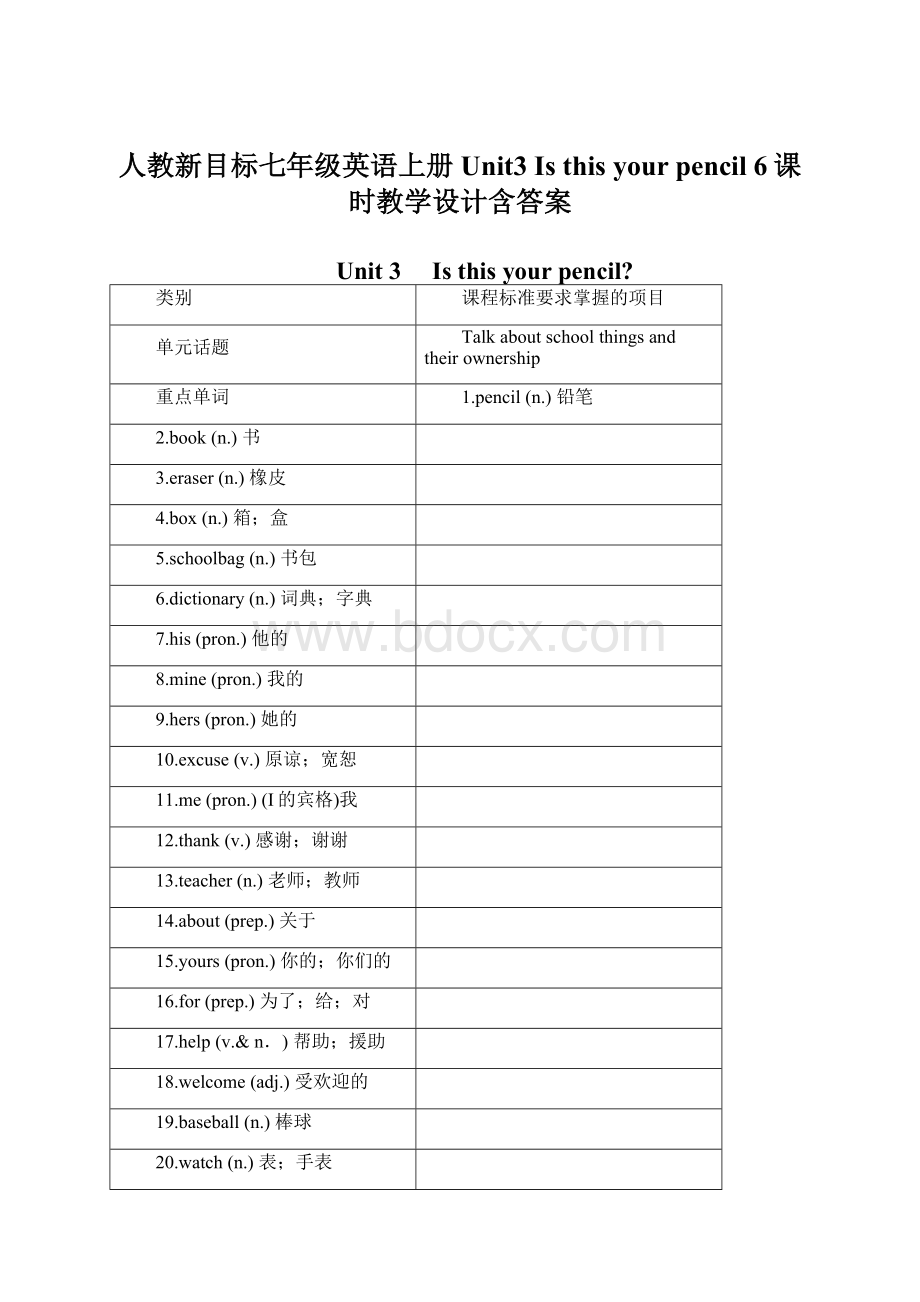人教新目标七年级英语上册 Unit3 Is this your pencil 6课时教学设计含答案文档格式.docx
《人教新目标七年级英语上册 Unit3 Is this your pencil 6课时教学设计含答案文档格式.docx》由会员分享,可在线阅读,更多相关《人教新目标七年级英语上册 Unit3 Is this your pencil 6课时教学设计含答案文档格式.docx(19页珍藏版)》请在冰豆网上搜索。

n.)帮助;
援助
18.welcome(adj.)受欢迎的
19.baseball(n.)棒球
20.watch(n.)表;
手表
puter(n.)计算机;
电脑
22.game(n.)游戏;
运动;
比赛
23.card(n.)卡片
24.notebook(n.)笔记本
25.ring(n.)戒指
26.bag(n.)袋;
包
27.in(prep.)在……里
28.library(n.)图书馆
29.ask(v.)请求;
要求;
询问
30.find(v.)(过去式、过去分词found)找到;
发现
31.some(adj.)一些;
某些
32.classroom(n.)教室
33.e-mail(n.)(=email)电子邮件
34.at(prep.)按照;
根据;
在(某处、某时间或时刻)
35.call(v.)(给……)打电话
36.lost(v.)(动词lose的过去式)遗失;
丢失
37.must(modalv.)必须
38.set(n.)一套;
一副;
一组
重点词组
1.pencilbox铅笔盒;
文具盒
2.excuseme劳驾;
请原谅
3.thankyoufor…为……而感谢你
4.ask…for…请求;
恳求(给予)
5.IDcard学生卡;
身份证
6.asetof一套;
重点句式
1.—Isthisyourpencil?
这是你的铅笔吗?
—Yes,itis.是的,它是。
2.—Aretheseyourbooks?
这些是你的书吗?
—No,theyaren'
t.Theyarehers.不,它们不是。
它们是她的。
3.Isthatyours?
那是你的吗?
4.Whatabout…?
(询问消息或提出建议)……怎么样?
……好吗?
5.—Thankyouforyourhelp.谢谢你的帮助。
—You'
rewelcome.别客气。
单元语法
1.Possessivepronounsmine,yours,his,hers
2.Yes/Noquestionsandshortanswers
学情分析
通过前两个单元的学习,学生已经学会了陈述句的基本句型结构。
在此基础上学习本单元,学生应该容易掌握,但仍需多讲解,多辅导。
第一课时 SectionA(1a~1c)
课时要点
1.pencil(n.)铅笔 2.book(n.)书 3.eraser(n.)橡皮
盒5.schoolbag(n.)书包6.dictionary(n.)词典;
7.his(pron.)他的8.mine(pron.)我的9.hers(pron.)她的
pencilbox铅笔盒;
—Yes,itis.It'
smine.是,它是我的。
2.—Isthatyourschoolbag?
那是你的书包吗?
—No,itisn'
t.It'
shis.不,它不是。
它是他的。
3.—Aretheseyourbooks?
§
自主学习案
◎新词自查
根据句意和汉语提示完成句子。
1.Thatishispencil(铅笔).
2.—Isthisyourschoolbag(书包)?
t.
3.It'
smybook(书).
4.Whatcoloristheeraser(橡皮)?
5.Isthathisdictionary(字典)?
课堂导学案
Step1 准备与热身(Preparation)
Learnthechant.
T:
Let'
ssingthechanttogether.
my是我的,your是你的,男的他是his,女的她是her;
名词前面常站岗,限定所属有功劳。
(Thisactivitywarmsupthestudentsaswellasprovidesreviewofthepossessiveadjectives.)
Step2 呈现与输入(Presentation)
1.Presentthenewwords.
Teachershowssomerealschoolthingstostudentsandasksomequestionsaboutthemtohelpstudentstolearnthenewwords.
2.Practicethenewwords.
Now,pleaselookatthepictureinyourbooks.Canyouputthewordswiththeobjectsintherightpictures?
Writethelettersnexttothewords,please.(GiveSsabouttwominutestofinish1a.)
Thenchecktheanswers.
Ss:
…
(Thisactivityintroducesthenamesofsomecommonpersonalpossessions.)
Getstudentstopracticeconversationsandcommunicatewitheachotherusingthefollowingsentences:
What'
tthis/thatinEnglish?
It'
sa/an…
—Isthis/thatyour…?
—Yes,itis./No,itisn'
—Isthis/thathis/her…?
Step3 练习与体验(Practice)
Playthetapeof1b,getstudentstolistenandnumbertheconversations,thenfinishtheteachingtaskof1b.
Step4 运用与生成(Production)
sreadtheconversationstogether,payingattentiontothepronunciationandintonation.
Thenleavestudentsseveralminutesforthemtopracticetheconversations.
Encouragethemtomaketheirownconversationsusingtheschoolthingsintheclassroominpairs.
Finally,invitesomepairstoactouttheirconversations.
Step5 巩固与提高(Progress)
【探究点】
Isthatyourschoolbag?
那是你的书包吗?
Isthis/that…?
是一般疑问句,意为“这/那是……吗?
”回答时要用yes(是)或no(不是),且答语中要用it代替this或that,即Yes,itis./No,itisn'
【针对训练】
—Isthishispencil?
—__C__.
A.Yes,it'
s B.Yes,it'
smypencil C.No,itisn'
t D.Thisishispencil
—Aretheseyourbooks?
这些是你的书吗?
t.They'
rehers.不,不是。
这些是她的。
该句是含be动词的一般疑问句。
其结构为“Are+主语+…?
”。
读时用声调,回答时用Yes或No进行简略回答。
句中hers意为“她的”,该词为名词性物主代词,在句中作表语,此外它还可以作主语。
而her为形容词性的物主代词,在句中作定语。
Thispenis__D__andthatis______pen.
A.mine;
hersB.my;
herC.my;
hersD.mine;
her
Step6 家庭作业(Homework)
1.Readthewordsin1aandrememberthem.
2.Readtheconversationsinpicture1aandtrytorecitethem.
3.Previewthenextperiod.
4.完成学生用书本课时练习。
第二课时 SectionA(2a~2d)
1.excuse(v.)原谅;
宽恕 2.me(pron.)(I的宾格)我
3.thank(v.)感谢;
谢谢4.teacher(n.)老师;
5.about(prep.)关于6.yours(pron.)你的;
7.for(prep.)为了;
对8.help(v.&
9.welcome(adj.)受欢迎的
1.thankyoufor…为……而感谢你
2.excuseme抱歉;
劳驾
1.Isthatyours?
2.Whatabout…?
/……好吗?
3.—Thankyouforyourhelp,Anna.谢谢你的帮助,安娜。
用所给词的正确形式填空。
1.Thosearemyerasers(eraser). 2.They'
reBob'
s(Bob)pencils.
3.Thebluepenishis(he).4.ThisdictionaryisHelen'
s(Helen).
5.Isthiseraseryours(your)?
6.Thepencilboxishers(her).
7.Thankyouforyour(you)help.
Wehavesomeschoolthingsatschool.Thethingsareveryimportanttoourstudy.DoyouknowhowtosaytheminEnglish?
Ifyoucan'
t,pleasedon'
tworryaboutit,youcanknowthemafterthisclass.Thenshowsomepicturesoftheschoolthingstoletthestudentslearn.
1.Playthetapeof2a,getstudentstolistenandcheckthethingstheyhear.
2.Playthetapeof2b,getstudentstofillintheblankswiththewordstheyhaveheardonthetape,thenfinishthetaskof2b.
Askstudentstoreadthroughthesampleconversation.Thenmaketheirownconversationsusingtheschoolthingsintheclassroominpairs.Leavethemseveralminutestodothistask.
Sampleconversation:
—Isthisyourpencilbox?
—Yes,itis.
—Isthatyoureraser?
ThefollowingisaconversationbetweenteacherandAnna.First,readitsilentlyandtellmewhattheyaretalkingabout.
Inviteastudenttoanswerthequestion.
Asktwostudentstorole-playtheconversation.Askotherstolistencarefully,payingattentiontothepronunciationandintonation.
Explainsomelanguagepointstomakestudentsunderstandtheconversationbetter.
Excuseme,Grace.Isthisyourpencil?
格雷斯,请问这是你的铅笔吗?
excuseme与sorry都可以表示“对不起”,但两者的用法不同,不能混用。
excuseme用于打扰别人、询问、请求的情况,意为“劳驾、请问、对不起”。
sorry则表示“对不起,抱歉”,用于表达由于自己的过失对别人造成了影响或不能满足别人的请求时的歉意。
打扰一下,请问洗手间在哪里?
Excuseme,whereisthewashroom?
Thankyouforyourhelp.非常感谢你的帮助。
在英语国家里,当收到别人赞许或夸奖时,我们应该用thankyou或thanks来表达谢意。
对还需要感谢的内容,thanksfor…也可以说成thankyoufor…,表示“因……而感谢你”,for后接感谢的内容、原因。
介词后面接名词、动名词作宾语。
即thanksforsth.或thanks/thankyoufordoingsth.。
thank为动词,意为“感谢,谢谢”,后接表示人的名词或代词,而不能直接接物。
谢谢你帮助我的学习。
Thankyouforhelpingmystudy.
Whataboutthisdictionary?
这本字典怎么样呢?
Whatabout…?
意为“……怎么样呢?
相当于howabout…?
是提建议或询问的一种方式。
其结构常为以下三种:
①Whataboutsb.?
②Whataboutsth.?
③Whataboutdoingsth.?
这本书是他的,那么这块橡皮呢?
Thisbookishis,andwhataboutthiseraser?
1.Readtheconversationin2dandtrytorecitethem.
2.Makeyourownconversationsbyusingthetargetlanguageinthisperiod.
第三课时 SectionA(GrammarFocus~3c)
2.—Isthishisgreenpen?
这是他的绿色笔吗?
3.—Isthatyourschoolbag?
4.—Aretheseyourbooks?
◎语法自测
一、按要求写出下列单词的相应形式。
1.that(对应词)this
2.yes(反义词)no
3.isnot(缩写形式)isn'
t
4.aren'
t(完全形式)are_not
5.that(复数形式)those
二、根据汉语意思完成句子,每空一词。
6.——这些是尺子吗?
——不,不是的。
他们是铅笔。
—Aretheserulers?
t.They'
repencils.
7.——那是一个苹果吗?
——不,不是。
—Isthatanapple?
t.
Reviewthedrills.
(Putsomepaperwiththenamesandtelephonenumbersontheblackboard.)
Pleaselookattheblackboard.Andanswermyquestions,please.Isthisyourfirstname?
S1:
No,itisn'
Isthatherlastname?
S2:
Yes,itis.
Isthishistelephonenumber?
S3:
Good.Thistime,whowouldliketocometotheblackboardandaskquestionslikeme?
(Studentsinturncometotheblackboard,pointtothepaperandaskquestions,thenaskotherstudentstoanswer.)
First,tookatthesentencesandshortformsintheboxesofGrammarFocus.
1.Readthemtogether.Thenasksomestudentstoreadthesentences.Correcttheirpronunciationmistakesifany.
2.Showsomeschoolthingslikeabook,aruler,adictionaryandapencilbox.Askstudentstomakeconversationsinpairslikethis:
Excuseme.Isthisyourbook,LiYang?
Yes,itis.Thankyou.
Andisthatyourdictionary?
sherdictionary.
Askseveralpairstocometothefrontandactouttheirconversations.
(Putsomepicturesofthingsstudentshavelearnedinclassnexttothenamesofthestudents.)
Isthisyourbook?
(Pointtopicture1.)
S4:
t./Yes,itis.
Aretheseyourpencils?
Yes,theyare./No,theyaren'
Isthathisruler?
(Pointtopicture2.)
S5:
Arethoseherpens?
(Getthestudentstoaskthequestionsinturn,makesuretheyusetheitemstheylike.)
(Thesetwoactivitiesnotonlywarmupthestudentsbutalsoprovideabriefreviewofthekeyvocabularyandthetargetl